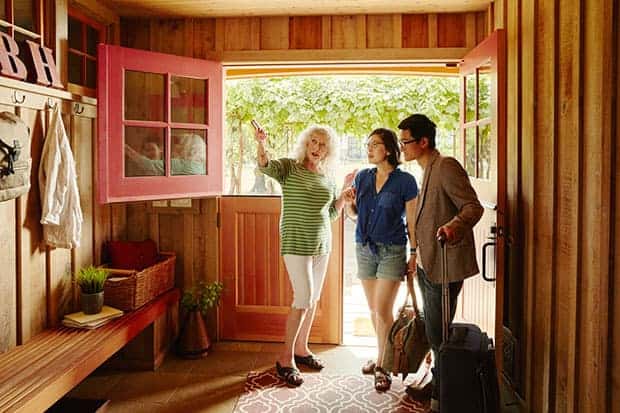You’re not alone if you’re considering hosting but don’t know how to attract clients or provide a memorable experience for them. Becoming an Airbnb Host is a rewarding and delightful way to meet new people and earn extra cash. So trust me when I say it’s totally normal to have many questions at the beginning.
This article covers the basic and professional steps required to become an Airbnb host.
Let’s jump right in…
Different Hosting Options
If you are interested in becoming a host, Airbnb provides three options. In fact, you don’t even have to be the property owner to benefit from some of them. Even if you only have a spare room in your house, you should think about renting it out.
#1. Using Airbnb to Rent Your Space
If you have a rental property that you want to list for guests on the platform, you must first register with the site. After that, you can log in and start creating your listing. Your rental property’s listing is a presentation of what it has to offer. It will include images that you can easily upload, as well as a detailed (but honest) description of the property.
As a host, you must establish house rules for your guests and determine when the property is available for booking. Hosting on the site is simple because the platform includes a variety of tools to help owners from start to finish. Both guests and hosts have the option to leave reviews, which increases the exposure of your rental.
There is always some concern about damage for those who are new to renting, especially when renting out the property to an unknown guest. Airbnb provides a host guarantee to provide some peace of mind. This additional coverage (in addition to your regular insurance) protects you financially in the event of damage.
There are some restrictions regarding the use of this coverage, but it is reassuring for hosts to know that it is available in the event that they require it. There are a few other terms to learn about host cancellation, but they are fairly straightforward.
#2. Taking on the Role of a Co-Host
Not everyone owns a property that qualifies them to be an Airbnb host. It is possible to become a co-host in this case. This means that people who want to rent can offer co-hosting services to those who own vacation rentals in their area.
A co-host can participate in a variety of ways. These people can be in charge of screening guests and answering their questions. They can also take a more hands-on approach by preparing the property for rental. A payment agreement is reached between the host and co-host, and Airbnb ensures that the co-host is paid.
As a co-host, you can assist a host in improving their customer experience and possibly achieving Superhost status. As a host, you may discover that having a co-host is a huge benefit. Even though the platform is simple to use, hosting requires time and dedication.
If you don’t have the extra time to devote to your responsibilities as a host as a travel property owner, a co-host would be a huge help. To add up to three co-hosts to your Airbnb listing, follow these steps:
- Navigate to Listings
- Choose the listing to which you want to add a co-host.
- Choose Co-Hosts
You’re ready to go if you follow the instructions!
#3. Hosting an Experience
You can now host an experience as a host if you want to become more interactive as a host. This is where you get to plan an event for visitors who are staying in a vacation home in your area. To take advantage of this, you must plan your experience and submit it to Airbnb.
How to Become a Host on Airbnb
#1. Determine whether your space is a good fit
There is no space that is too small or too unique to list on Airbnb! Every space has a guest—all you have to do is set clear expectations by honestly and accurately describing your space’s features, from narrow doorways to rustic staircases.
Before you begin hosting, you should also learn about the laws and taxes that apply to short-term rentals in your area. Airbnb cannot provide legal or tax advice, but we can help you find information about hosting regulations.
#2. Prepare your space for visitors
Do you own a varied collection of vintage movie posters? Or a collection of interesting art history books? Display them! Including personal information can help your listing stand out.
Remember to remove clutter and try to provide basic amenities, such as toilet paper, soap, and towels, when sprucing up your space to help create a great experience for your guests. A local bottle of wine or a box of chocolates can also make guests feel special.
#3. Make a list of your available space
Listing your space is completely free. Only when a reservation is confirmed does Airbnb charge a service fee. This fee is typically 3% of your booking subtotal and goes toward covering the costs of running Airbnb, such as 24/7 customer support, Host protections, and other services.
Pay close attention to your photos as you add listing details because they’re often the first thing guests notice before booking. Some Hosts hire professional photographers, while others use their smartphones to capture the details and spirit of their space.
#4. Determine how you will host the event.
On Airbnb, you will always have complete control over when and how you host. You can manually block days when your space is unavailable using our calendar and booking settings, select specific check-in and checkout times, set a minimum or a maximum number of nights guests can stay, and more.
You can also use your house rules to set expectations for visitors and to specify what is and isn’t permitted in your home.
#5. Set your own price and get paid for it.
It is entirely up to you how much you charge on Airbnb. Consider what others in your area charge, the amenities you provide, and the time of year when developing your pricing strategy. This can assist you in determining a price that feels right for you and your guests.
In the Payments & Payouts section of your account, Airbnb makes it simple to configure your payout method. Depending on where you live, payment methods include bank transfers or direct deposit, Payoneer debit cards, PayPal, and Western Union, among others.
Airbnb Host Requirements
While almost anyone can become an Airbnb host, there are a number of requirements and expectations that must be met in order to maintain a high level of quality.
The following are the basic requirements for becoming an Airbnb host, according to Airbnb:
Respond to questions
Airbnb favors hosts who are attentive, responsive, and considerate. As a result, hosts should keep a high response rate and respond to reservation requests and booking inquiries within 24 hours.
Take requests
If your calendar is clear, Airbnb expects you to accept the majority of the requests that come your way. However, if you know you won’t be able to host on certain dates, keep your calendar up to date. If you need to take time off during your vacation or simply need more time between bookings, do so to avoid irritated guests.
Cancellations should be avoided.
Airbnb penalizes hosts who cancel confirmed reservations. However, there are some circumstances in which a host may cancel (such as a pandemic!).
Keep your overall rating high.
Airbnb also rates hosts based on their overall rating, which is the average review score from all of the guests they have hosted.
You can always check your Performance to see how you’re doing and avoid penalties. By comparing your performance to the average of all hosts, Airbnb will tell you where you can improve.
What is the minimum age to host on Airbnb?
To create an account on Airbnb, you must be at least 18 years old, according to the platform’s Terms of Service. This applies to both hosts and guests who wish to use Airbnb’s website and services.
Guests under the age of 25 are not permitted to book entire listings in some locations in order to avoid house parties. They can, however, book if you have a private room or a hotel room available.
What You Should Do Before Signing Up for Airbnb
Here are some Airbnb host tips to help you get your business up and running quickly.
Before you add anything to your Airbnb profile or listing, consider your market and how you’ll stand out from the crowd.
Do you already own a home or a room that you can rent out to guests? If this is the case, consider the following:
- Is the area around my property attractive and safe for visitors?
- Is my home close to any tourist attractions?
- Is my city a popular tourist destination each year?
- Is it necessary to renovate my rental?
- Should I invest in new furniture?
- Is the property inviting and clean enough for visitors?
- Is it okay for me to invite strangers to my rental?
- Is there anything I could do to make my property even more appealing to visitors?
- How much time and money can I devote to this venture?
Before starting any kind of business with Airbnb, you should always do three things:
- Make a profitable business plan.
- Conduct market research
- Examine your competition and learn from them.
Understand Your Competition
Determine your competitors and spend some time researching what they do well. You can do this directly on Airbnb by searching for properties in your area that have similar features. You can use filters to narrow down properties that have the same number of bedrooms, bathrooms, similar kitchen facilities, and other amenities such as pools or gardens.
Once you’ve identified a number of competitors, examine their photos, furniture, and reviews. Learn what their guests like and dislike about them and why! By looking at what other hosts do well, you can be inspired and get ideas for your own Airbnb listing.
You can also use the average price for similar properties in your area to determine how to price your own. You can then compare your estimated rates to those of smaller and larger properties in the same area to ensure they are appropriate.
Understand Your Target Market
When you start anything related to your vacation rental business, keep your target audience in mind. Determine your ideal guests and center all of your property marketing strategies on them:
- Don’t show pictures of college students jumping in your pool during spring break if your property is more suitable for a young family.
- Similarly, if you’re targeting retired travelers, don’t turn them off with pictures of children’s toys all over the place!
Understand Your Location
If you’re not sure who your target market is, the main factors that can help you identify it are the location of your property and the rental itself. Your vacation rental neighborhood has a lot of influence over the type of visitors it attracts.
Most travelers, whether for business or pleasure, have a reason for wanting to stay in a specific area. This could be due to a famous landmark, a tourist attraction, or even a nearby event.
Consider the following when choosing a location for your vacation rental:
- Who lives in the surrounding area? Is it a family area, a student area, or a commercial area?
- What draws people to the area? Is it the proximity to Disneyland, the vibrant nightlife, or the massive sports stadium that attracts visitors?
- Where do you call home? Is it in a trendy hipster neighborhood, the city’s financial district, or close to a world-class event venue?
- How many hotels are in the area? If there aren’t many people around, you might be onto something big. Your vacation rental could be one of the best options for any type of visitor visiting your city! However, if there are many hotels, it may be difficult to compete with their pricing. Check and compare rates with other types of lodging in your area.
Understand Your Property
You can deduce potential guests by thinking about your property specifically after you’ve defined the types of people who live in your area and the travelers who will be drawn to your neighborhood.
For Example:
- What is the nature of your property? To use Airbnb jargon, are you offering an entire home, a private room, a shared room, or a one-of-a-kind property?
- What are the features of your property? Is it possible for guests to use the laundry facilities? Kitchen? What about a swimming pool? Backyard?
- How does your location compare to others in the area? Is it the neighborhood’s crown jewel or somewhere you wouldn’t want to pass in the dark?
- You’ll be able to think more deeply about the target market you’ve identified once you’ve answered these questions about your property and location. This is not to say you will only attract these types of guests, but they will most likely make up the majority of your yearly bookings.
How to List Your Airbnb Property
Whether you’re listing a house or just a room in your apartment, the first thing you must do before creating an Airbnb listing is sign up for a free account on the platform.
- After logging in, go to the top right corner of the Airbnb homepage and click Become a Host. You’ll be asked to enter some basic property information, such as the address, home type, and number of guests.
- When asked to fill out the home type, specify whether you’ll be renting out an apartment, house, secondary unit, unique space, bed, and breakfast, or boutique hotel.
- You must specify whether you are renting out the entire facility, a private room, or a shared room.
- When it comes to the number of guests, make sure to include extra bedding, such as sofa beds, but don’t overestimate your property’s capacity. You want your guests to be comfortable and have an experience that is consistent with your listings, so be accurate and realistic when calculating the number of guests your rental can accommodate.
- When you click + Let us know if guests have access to any special spaces, a drop-down menu will appear from which you can select the property type (apartment, B&B, boutique hotel, house, etc.). The number of bedrooms and bathrooms can then be entered.
- In the + Add any special amenities section, you can inform potential guests if your listing has amenities such as a gym or if it is a waterfront property.
- You will be redirected to another page once you have finished configuring your listing. Fill in more information about your property and its guests, as well as the location, amenities, photographs, descriptions, title, booking settings, calendar and availability, and pricing.
- The final step is to go over everything again, and you’re done!
How many steps are required to start hosting on Airbnb?
After deciding to host an Airbnb, there are only three simple steps to take. First, list your free space. You must then decide how you want to host. You have the option of creating your own schedule, pricing, and guest requirements. Finally, you can greet your first visitor. Once the listing is live, qualified guests will be able to contact you for bookings.
Is it possible for anyone to become an Airbnb host?
In most areas, becoming a host is simple, and creating listings is always free. You should review their community standards and guidelines to learn more about what they expect from their hosts and Airbnb users to see if you would be a good fit as an Airbnb host. You will also find useful information about safety, security, dependability, and other topics.
What if property damage occurs?
Airbnb has a feature called the Airbnb Host Guarantee. This host guarantee protects the host for up to $1,000,000 and will cover any damage to the property if the damage exceeds the security deposit paid by the guests.
However, there are some limitations to their host guarantee and host protection insurance that you should be aware of. These exclusions can be found on the Airbnb website under the host protection insurance section. There is also a list of countries that are eligible.
Why should we use Airbnb to host?
Still on the fence about hosting your vacation rental on Airbnb? They make it a simple, secure, and simple process to follow. They also allow you to maintain control over the availability of your space, the rules, the prices, and how you interact with your guests.
Are the guests who book through Airbnb verified?
Yes. When making a reservation at an Airbnb rental property, all guests are required to provide specific information. This data includes a verified phone number and email address. A verified ID, as well as recommendations from previous Airbnb hosts, can also be requested.
Related Articles
- Spirit Airlines Logo: Meaning, Evolution & History
- PROPERTY MANAGER: Definition, Job, Duties & Salary
- 10 Potential Benefits of Investing in a Property Management Business
- PROPERTY MANAGEMENT AGREEMENT: Form & Templates






